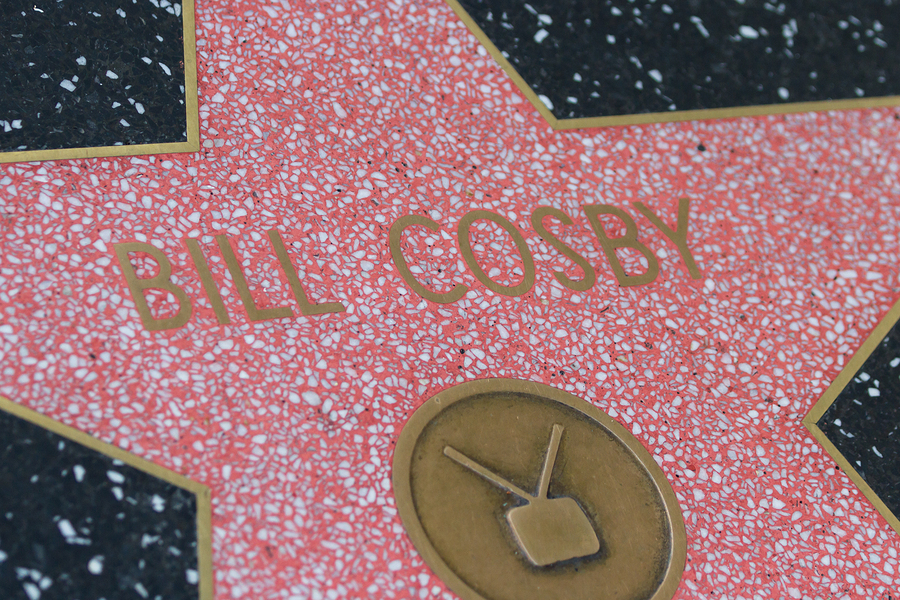 Over the course of the last year, Bill Cosby has fallen hard from his place as a beloved figure in American culture to a disgraced man who is constantly at war for over his legacy. His status as the icon of family entertainment and solid values has been thrown completely into question with the sensational allegations against him, with dozens of women accusing Cosby of having drugged and then raped them. Recently there has been a release of deposition information from 2005 in which Cosby admits to having pursued the purchase of the now illicit drug quaaludes for the purposes of giving it to women in a sexual context.
Over the course of the last year, Bill Cosby has fallen hard from his place as a beloved figure in American culture to a disgraced man who is constantly at war for over his legacy. His status as the icon of family entertainment and solid values has been thrown completely into question with the sensational allegations against him, with dozens of women accusing Cosby of having drugged and then raped them. Recently there has been a release of deposition information from 2005 in which Cosby admits to having pursued the purchase of the now illicit drug quaaludes for the purposes of giving it to women in a sexual context.
What are Quaaludes?
Qualludes is the brand name for the drug methaqualone and was a popular sleeping pill in the 1960's. In the 1970's and 1980's it transitioned from a prescription drug (it was classified as a narcotic in 1973) to a party drug, and was widely used to help individuals come down easier from a cocaine high. President Ronald Reagan banned the drug outright in 1984. Quaaludes were considered to be a highly desirable “love drug” in the 1970's when it was still a legal prescription drug, used to heighten the sexual experience, particularly in women.
Understanding the Story
There has been an explosion in the media since it came to light that Bill Cosby admitted under oath that he had bought quaaludes to give to young women to have sex. This revelation added fuel to the already sweeping allegations that he had drugged and then sexually assaulted more than three dozen women. But how, if Cosby admitted this under oath, has he not been charged with any crime? The answer is that his admission is more complex than is being widely reported in the media.
The admission came in 2005 during a deposition as part of the Andrea Constand case, which was settled out of court. During that deposition, Cosby admitted to obtaining quaaludes through a prescription and for the purpose of giving them to young women, however when asked if he ever gave them to a young woman without her knowledge, his lawyer objected before he was able to answer. According to his lawyers, two of the women that Cosby is accused to drugging took the quaaludes consensually. His admissions in that 2005 deposition, which are regarding actions that took place during the 1970’s when quaaludes were still legally prescribed, do not indicate any criminal action on his part, though his accusers and many in the media and the general public argue that it bolsters tremendously the likelihood of his guilt.
Hero vs. Celebrity
The question quickly arises as to why there is such decisive and near society-wide tearing down of Bill Cosby in the aftermath of these allegations. When the first several trickled out more than a decade ago, even though there was an out of court monetary settlement on the part of Cosby to an accuser (some would argue implying guilt), there was not the vilification in the American public that there has been in the last year as these allegations have swept the media and dominated it. There is a section of the public asking the following questions as the fallout continues: Why is Roman Polanski, the director who is accused of using these same quaaludes drug in order to rape a child, not being torn down in the public eye in the same way? Why is it that Polanski has been awarded Academy Awards and Golden Globes after pleading guilty to heinous sexual acts while Bill Cosby, yet to be charged, recently had his statue removed from Disney World? Why is Hugh Hefner, who has admitted to using similar substances, still held as an American icon? Drug culture and bad behavior among celebrities is almost an expected aspect of the entertainment industry - so why the fuss over Cosby?
The answer, as far as the sway of public opinion, might truly lie in the deep divide between hero and celebrity.
Whereas Hefner and Polanski are both famous, with profitable careers and plentiful followers, Cosby is more than that in the eyes of Americans. Cosby is not merely a celebrity, not merely someone who the public follows in the media, he is an American hero. North, Bland and Ellis (2005) found that people are more likely to demonstrate emotional involvement with their heroes and some element of disdain toward their favorite celebrities. For generations of Americans, Bill Cosby represented the hope of a brighter future, and of the change that each person could make within their own lives in the pursuit of their happiness. He was loved by all, having starred in the I Spy” and the PBS children's series The Electric Company” in the 1970, followed by his tenure as Cliff Huxtable as America's Dad; throughout the 1980's. Cosby cast himself as the conscience of America, taking to task individuals who did not step up to take responsibilities for their actions. He far transcended the realm of celebrity to become and hero for everyone.
Celebrity and Narcissism
There is a reality to celebrity. Pinsky and Young (2006) point to narcissism as a driver of celebrity behavior, and it’s often hypothesized as the explanation when celebrities engage in extraordinary and sensational actions, as in the case of Cosby. Pinsky and Young (2006) the Narcissistic Personality Inventory (NPI) to compare the narcissism levels of 200 celebrities versus 200 MBA students. Their findings in this first of its kind study showed that indeed celebrities rank much higher on the NPI than do their non-celebrity counterparts.
There are some truly positive aspects of narcissism that also incidentally tend to line up with the qualities of the entertainment industry. These are:
- Extraversion
- Lower rates of depression
- Strong likeability
- Strong public performance
Then there are the negative aspects of narcissism, those that ring true in cases like Cosby’s, as well as in the bad behavior of so many others. Often the initial positivity that comes from the previous four qualities changes to negativity as the following characteristics become more evident:
- Crave attention
- Be overconfident
- Lack empathy
Narcissism offers a complex set of challenges and advantages, and while it’s not clear whether it has been a driving force in the fall of one of America's most beloved icons, it certainly offers an intriguing lens through which to view the events and in fact the recent revelations from the released deposition regarding quaaludes. One thing is obvious in the aftermath of the released deposition - Bill Cosby's admission of using and dispersing a known narcotic has even further damaged his status as one of America's heroes.
References
Dale, M. (2015). “Cosby Said He Got Drugs to Give Women for Sex. Time. Accessed on 8 July 2015. Retrieved from http://time.com/3947264/bill-cosby-quaaludes-sex/
Mark Young, S., & Pinsky, D. (2006). Narcissism and celebrity. Journal of Research in Personality, 40(5), 463-471.
North, A., Bland, V., & Ellis, N. (2005). Distinguishing heroes from celebrities. BRITISH JOURNAL OF PSYCHOLOGY, 96(Pt 1), 39-52.
About the Author

Autumn Robinson, MA, PhD Candidate
Autumn Robinson is a writer and PhD candidate who lives in the beautiful Blue Ridge Mountains of North Carolina with her husband, three young boys and daughter with special needs. She is a former special education teacher who believes that all people deserve to be treated with dignity and respect. Autumn is the Digital Manager for Vestidd, an innovative cloud based program that helps families with special needs to organize and manage their often complex responsibilities.